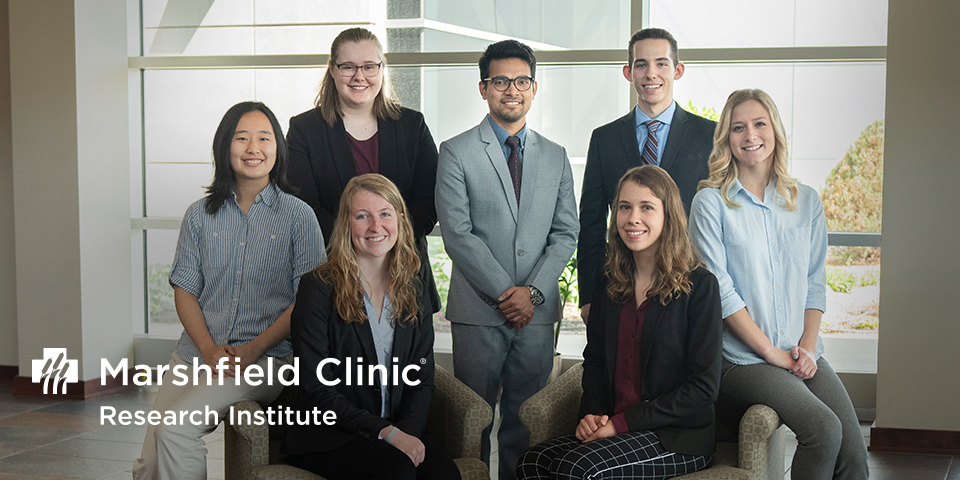Marshfield Clinic Research Institute is pleased to conclude another session of its Summer Research Internship Program (SRIP) with a symposium from 9-11:30 a.m., Wednesday, Aug. 7, in the Froehlke Auditorium. A luncheon follows the presentations.
This summer, SRIP is celebrating 45 years of providing real-world experience for undergraduate and graduate students considering a career involving research. Summer projects are tailored to each student's skill level and are related to ongoing research at Marshfield Clinic Health System.
The program enables students to put their education into practice as they work side-by-side with scientists and clinician-researchers who are experts in their fields. It is directed by Huong McLean, Ph.D., research scientist for the Center for Clinical Epidemiology and Population Health at the Research Institute.
"We are deeply thankful for the program's continued leadership under the direction of Dr. McLean and our invaluable mentors," said Research Institute Executive Director, Amit Acharya, Ph.D., B.D.S., M.S. "The dedication of our research scientists to this incredible program and the strong support from the donors is the reason it has endured for more than four decades."
SRIP is supported entirely through philanthropy. Thanks to the generosity of many community partners, Health System employees, foundations, businesses and a major sponsorship by The Boldt Company, the program had the financial resources to host seven students this year.
"We are incredibly grateful for the organizations and individuals who continue to support the Summer Research Internship Program," said Karen Piel, gift planning officer, Foundation. "The cost of providing this investment for the future of medicine is upwards of $10,000 per intern we host. Thanks to our amazing supporters, these costs are covered and this program is able to continue to provide a unique learning experience for the program participants, as well as to advance the research being conducted at Marshfield Clinic Research Institute."
Health System staff and physicians are invited to attend as many of the presentations as schedules allow. The symposium also can be viewed internally via MediaSite Live.
Presentations, in order of appearance, are as follows:
- Hospital Readmission Following Pancreaticoduodenectomy: A Single-Center, Retrospective Review, 2008-2018: Mentored by Jessica Wernberg, M.D., and Rohit Sharma, M.D., in General Surgery, Hannah Van Steenburgh evaluated hospital readmissions following pancreaticoduodenectomy at the Health System to determine whether readmission rates at a rural tertiary care center were comparable to nationally reported data. Hannah is a senior at University of Wisconsin-Eau Claire pursuing a major in biology and plans to attend medical school upon graduation.
- Robotic Assisted Cytoreductive Surgery (CRS) and Hyperthermic Intraperitoneal Chemotherapy (HIPEC) in the Treatment of Patients with Peritoneal Carcinomatosis are Safe and Feasible in a Tertiary Rural Care Center: Under the mentorship of Rohit Sharma, M.D., in General Surgery, Johanna Ellefson examined Health System patient experience with the robotic assisted CRS/HIPEC procedure and assessed its safety and feasibility. A Spencer native, Ellefson is currently pursuing her Bachelor's degree in biomedical engineering at the University of Wisconsin-Madison.
- Assessment of 24 Hour Activity Patterns in Patients with Bardet-Biedl Syndrome: With guidance from Clinical Research Center scientist Jeremy Pomeroy, Ph.D., Michelle Petkovsek engaged in research that analyzed activity levels and sleep quality of BBS patients compared to their BBS genotype and age. Petkovsek is pursuing a degree in dietetics from University of Wisconsin-Stevens Point. Following graduation, she plans to pursue an advanced degree in either sports nutrition or sports medicine.
- Lyme Disease Incidence in Central and Northern Wisconsin, 2003-2018: Mentored by Center for Clinical Epidemiology and Population Health clinician-researcher Scott Olson, M.D., Katie Hirabayashi examined MESA and EHR data of Health System patients with Lyme disease to estimate annual incidence rates and describe patient demographic characteristics. Hirabayashi is pursuing an M.P.H. in epidemiology at the University of Maryland's School of Public Health.
- Examining Factors Underlying Emergency Visits in a Dental Setting for Non-traumatic Dental Conditions Among Patients with Local Access to Dental Care: Under the guidance of Ingrid Glurich, Ph.D., a scientist within the Center for Oral and Systemic Health, Arun Bhatta created a survey tool to assess variables associated with patients at high risk for non-traumatic dental condition visits to the emergency room and piloted its usage. Bhatta is currently pursuing a Master of Public Health at the University of North Dakota.
- Genome-wide Association Study of Telomere Length and Disease Associated Genetic Variants: Reynor Wilhorn interned within the Center for Precision Medicine Research under the guidance of Scott Hebbring, Ph.D., and Patrick Allaire, Ph.D. His study focused on determining associations between telomere length and known genetic variants. Wilhorn is a pre-medical student studying microbiology at the University of Wisconsin-Madison.
- Assessing Phenotypic Associations with Relative Average Telomere Length: Also under the mentorship of Scott Hebbring, Ph.D., and Patrick Allaire, Ph.D., Sierra Strutz engaged in research that identified associations between relative average telomere length and clinical disease states. Strutz is majoring in biochemistry at Lake Superior State University and plans to attend medical school upon graduation.

